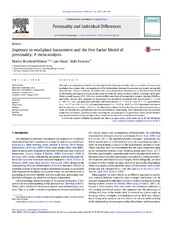Exposure to workplace harassment and the Five Factor Model of personality: A meta-analysis
Peer reviewed, Journal article
Published version

Åpne
Permanent lenke
https://hdl.handle.net/1956/15283Utgivelsesdato
2017-01Metadata
Vis full innførselSamlinger
Originalversjon
https://doi.org/10.1016/j.paid.2016.08.015Sammendrag
Although a growing body of studies has investigated the role of personality traits as correlates of exposure to workplace harassment, the true magnitude of the relationships between harassment and targets' personality characteristics remains unknown. To address this issue, relationships between traits in the Five-Factor Model of personality and exposure to harassment were examined by means of meta-analysis. Including studies published up until January 2015, 101 cross-sectional effect sizes from 36 independent samples, totaling 13,896 respondents, showed that exposure to harassment was positively associated with neuroticism (r = 0.25; p < 0.01; K = 32), and negatively associated with extraversion (r = − 0.10; p < 0.05; K = 17), agreeableness (r = − 0.17**; p < 0.01; K = 19), and conscientiousness (r = − 0.10* p < 0.05; K = 22). Harassment was not related to openness (r = 0.04 p > 0.05; K = 11). Moderator analyses showed that the associations between harassment and neuroticism, agreeableness and conscientiousness, respectively, were conditioned by measurement method for harassment, type of harassment investigated, and geographical origin of study. Summarized, the findings provide evidence for personality traits as correlates of exposure to workplace harassment.
